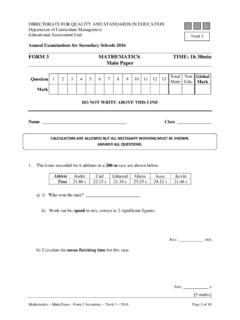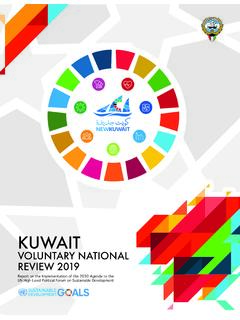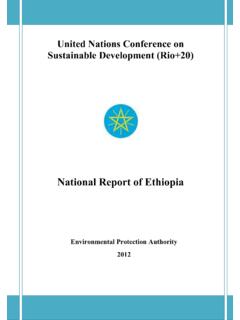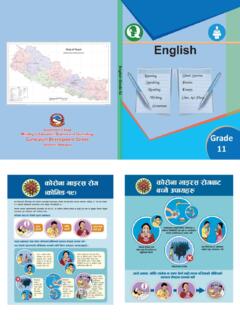Transcription of A National Curriculum Framework for All
1 A National Curriculum Framework for All2012 ministry of education and EmploymentMinistry of education and EmploymentA National Curriculum Framework for All 2012 ministry of education and EmploymentThe cover illustrates the heart of the National Curriculum Framework which is the classroom set-up, in which the teacher is given the latest technology to facilitate learning in an environment that captures diversity and inclusivity and leads students to work towards personal growth, an understanding of the values of solidarity and social justice, formal qualifications and employability. Picture taken by Roberto RunzaA National Curriculum Framework for AllMinistry of education and EmploymentDecember 2012A document prepared by the ministry of education and Employment.
2 It is available on the ministry of education and Employment website: contents of this publication may be reproduced in part, except for commercial purposes, provided that the extract is preceded by a complete reference to the ministry of education and Employment followed by the date of publication of the : ministry of education and Employment December & Print: Salesian Press - MaltaISBN: 978-99957-0-409-4iii THE National Curriculum Framework AIMS AT:1. encouraging children and young people and teachers to work together and learn from each sustaining individual attention, so that all children fulfill their capacity. 3. supporting schools to fulfill the expectations of children and their providing quality time for social interaction, non-formal learning and peer directing education leaders to rationalise the content of Learning Programmes so as to ensure quality and not magnitude.
3 6. ensuring that, in the context of the holistic entitlement of the Learning Areas, young people in compulsory education have as an indispensible prerequisite mastery in Maltese and English, Mathematics, a Science subject and Digital helping children to regard social justice and solidarity as key values in the development of the Maltese empowering parents and young people to work towards the acquisition of a formal qualification in key competences as the foundation for Lifelong supporting education leaders to successfully implement the NCF and systematically monitor its development at classroom level so that National targets are achieved within established requesting teachers to regard children as Malta s future workforce and therefore ensure that positive attitudes towards excellence, commitment, responsibility.
4 Flexibility and entrepreneurship form part of the learning National Curriculum Framework IS: a reference for action based on general consensus and the contribution of stakeholders as well as those committed to its implementation; a living Framework , in such a way that allows for adjustments to new developments during implementation; a policy instrument as well as information on the implementation strategy, actions and benchmarks for implementation, monitoring and evaluation; a response to the changing demands of individuals and society, rapid changes in our education system driven by globalisation, ICT development, competition, shift of traditional values and new from the Hon Dolores Cristina, Minister education and Employment viiLearning Together, Inspiring Success ixMessage from the President of the Malta Union of Teachers xiExecutive Summary xiiiReview of the National Curriculum Framework and Way Forward 101.
5 Review of the National Curriculum Framework following the Consultation Process A Sustained Process of National Consultation Position of the Working Group after Analysis of the Feedback Received A Framework for the National Curriculum The Principles and Aims of the New National Curriculum Framework The Learning Areas The Cross Curricular Themes Assuring that Every Learner Makes a Successful Transition Across the education Cycles Aligning Learning and Assessments to Learning Outcomes Aligning Learning Outcomes with the Level Descriptors of the Malta s Qualifications Framework Key Competencies, Employability and Mobility Monitoring and Benchmarking the Performance of the education System The Cycles of education Entitlement Professional Development of Teachers Securing Seamless Transition between the Secondary Cycle for education and Post-Secondary education 1902.
6 Outcomes and Outputs of the National Curriculum and its Implementation Outcomes and Outputs of the National Curriculum Framework Implementing the National Curriculum Framework 25 The National Curriculum Framework 2903. Main Tenets of the NCF Components of the National Curriculum Framework General Principles Aims of education Learning Areas and Cross Curricular Themes Effective Learning and Teaching Assessment and Evaluation Parental and community involvement Support Structures The Early Years (KG 1 Year 2) Purposes and general objectives The Junior Years (Years 3-6) Introduction Aims of the Junior Years Cycle The Secondary Years (Years 7 11) Introduction Aims for Secondary education 58 References & Appendices 69 References 71 Appendix I: The Terms of Reference of the Post-Consultation Working Group on the National Curriculum Framework 72 Appendix II.
7 The Constitution of the Working Group on the Post-Consultation National Curriculum Framework 73 Appendix III: The Level Descriptors of the Malta Qualifications Framework for Lifelong Learning 74 FiguresFigure 01: Relationship between Learning Outcomes, Programmes of Learning and Assessment, and Examinations 12 Figure 02: Monitoring and Benchmarking the education System 14 Figure 03: The Learning Areas and the Cross-Curricular Themes in the NCF 39 TablesTable 1 : Outcomes of education 2012 and Targets Set for 2027 24 Table 2 : NCF Implementation Strategy 26 Table 3 : Outcomes of education 2012 and Targets Set for 2027 67viiThe National Curriculum Framework (NCF) is the result of a long, nationwide consultation process.
8 The initial draft, launched in May 2011, served as a platform for discussion, debate and consensus-building. It is now with great satisfaction that I present a final document which illustrates the vision and aspirations of our leaders and interested stakeholders in education in Malta. My personal wish is that the Curriculum Framework will foster in students the desire to continue on a learning journey throughout their lives. The legacy that this document aims to achieve is the assurance that by the end of compulsory education learners will have acquired the necessary knowledge, skills, competences, attitudes and values that stimulate them to view lifelong learning as part and parcel of their development as individuals and as citizens of our country, of the European Union and of the world.
9 The NCF 2012 looks upon education as a journey towards personal enrichment and empowerment, as a mechanism to uphold social justice and as an important tool for inclusion and employability. It draws upon the experiences of previous documents related to the National Curriculum as well as on the experience of an educational system that led to the drastic reduction of early school leavers from over 54% in 2000 to 30% in 2012 and the dramatic increase of learners in higher education from less than 900 in 1987 to almost 20,000 in 2012. It has been created to contextualise learning between 2013 and 2026, to outline the milestones in the three education cycles of the Early Years, Primary and Secondary Years, to provide key indicators that schools should offer to enable learners to be qualified at the end of Compulsory education , to provide rationalised resources and infrastructure to achieve these goals and, finally, to set targets and the mechanisms to measure the extent of success and/or failure of the NCF in achieving its goals.
10 Message fromHon Dolores CristinaMinister of education and EmploymentThrough this NCF a number of ambitious but realistic targets have been set. The discussions that led to this final document have enriched our views of education and of the educational process. They have led us to take the decision to measure success and failure at the micro level of our schools on a regular basis. The strengths and the potential weaknesses of this Curriculum Framework will have to be regularly monitored. My clear political direction has been that in the Early Years and throughout Compulsory education , the commitment to our children must be monitored on a regular basis to ensure that not one single child is marginalised by the system itself.













